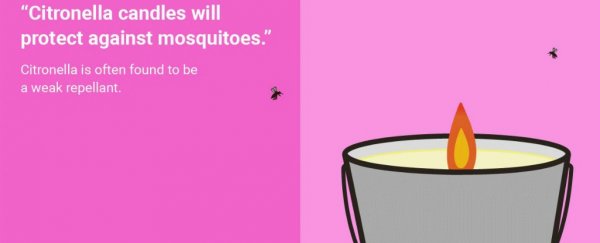There are a lot of misconceptions when it comes to controlling mosquitoes.
Despite what you may have heard, the food you eat won't affect your chances of being bitten, and neither will buying a bunch of citronella candles.
To help you separate fact from fiction, we spoke to Stan Cope, president of the American Mosquito Control Association and the director of entomology and regular services at Terminix.
From what types of repellents actually work to why the bloodsuckers bite you in the first place, here's the scoop on mosquitoes.
1. What you eat affects you being bit.

People often say that eating foods with garlic or high percentages of Vitamin B can help lower your chances of being bit, but Cope says there is no scientific evidence to support this claim.
In reality, how attracted a mosquito is to you can depend on factors like how much carbon dioxide you omit or how quick your metabolism is.
2. Citronella candles will protect against mosquitoes.

According to Cope, there is no scientific evidence to show that citronella candles actually repel mosquitoes.
Any repelling is typically coming from the smoke they produce, but once you have any wind, you easily lose protection.
3. Insect repelling plants work.

Plants will not repel simply by growing or being planted in the yard, but they will create more places for mosquitoes to rest, since the insects are attracted to cool, dark, and moist areas.
Some plants contain essential oils that do repel insects, but you need to crush or burn them for the repelling to work.
4. Bug zappers are effective at controlling mosquitoes.

While bug zappers do kill some mosquitoes, the majority of what they catch are actually other, beneficial insects like moths and beetles.
In two controlled studies conducted by investigators at the University of Notre Dame, mosquitoes made up only 4.1 percent and 6.4 percent of the daily catch from mosquito catchers over an entire season.
In both studies, there was no significant difference in the number of mosquitoes found in yards with and without zappers.
5. Dryer sheets help protect against mosquito bites.

People will sometimes place dryer sheets in their pockets, hat, or even on their skin to repel mosquitoes.
According to Dr. Cope, while studies may indicate that dryer sheets are successful at repelling certain species of gnats, their scent does not do the same for mosquitoes. In this case, it could mean that your distinct chemical signature doesn't attract most mosquitoes.
6. Over-the-counter mosquito repellents protect against mosquitoes.

Although some over-the-counter repellents do work, those without the specific ingredients recommended by the CDC do not.
The four ingredients listed by the CDC are DEET (which works best for long outdoor exposure), Picaridin (also known as KBR 3023, Bayrepel, and icaridin), IR3535, and the oil of lemon eucalyptus (OLE) or p-menthane-diol (PMD).
7. Mosquitoes only bite at night.

Some species of mosquitoes, like the Asian tiger mosquito, are known to bite during the day.
Often they are 'secretive biters' that bite around the knees and ankles, making it less likely for you to see them.
This article was originally published by Business Insider.
More from Business Insider:
